Geneva, Switzerland (June 13, 2022) – At the ongoing meeting of the Basel Convention, the Basel Action Network (BAN) and member organizations of the Break Free from Plastic movement (BFFP) presented evidence of continued plastic waste trade, exported primarily from the rich developed countries to weaker economies, and charged these exporting countries with failing to uphold the agreements to control plastic waste exports made at the Basel Convention in 2019, which came into force on January 1, 2021.
Among the 2021 trade data (Comtrade) findings presented by BAN and BFFP organizations:
• The European Union decided unilaterally to simply not enforce the Basel Rules for trade between member states. •
• Canada similarly decided to ignore the rules for their plastic waste trade with the US.
• Japan is the world's leading exporter of plastic waste to weaker economies.
• The US is the second-largest exporting country and has recently begun dramatically increasing their exports to Mexico.
• The Netherlands has become a conduit for exporting European plastic waste to Asia.
• The UK is shifting its exports from Turkey to Asia via the Netherlands.
• The US and EU illegally exported approximately 20,500 containers of PVC plastic waste last year.
“A year after the Amendments, major exporting and importing countries like Japan, the Netherlands, Germany and the UK are running away from the obligations they all agreed to undertake. They are simply business as usual, only this time the trade is illegal," said Jim Puckett, executive director of BAN. “We are seeing new schemes like refuse-derived fuel or solid recovered fuel exports that allow mixed plastic waste to still be traded despite the Amendments. We also see plastic mixed into waste paper exports. We call on Basel Parties to Member States to fully enforce the Plastic Waste Amendments and for countries to ratify the Basel Ban Amendment, which prohibits OECD countries from exporting hazardous waste.“
Representatives of South Africa, Nigeria, Indonesia, Malaysia, and Thailand presented pictures and described in harrowing detail the dumping and burning of plastic wastes caused by so-called plastics recyclers operating in their territories.
“Communities in the Global South – Asia-Pacific region, Latin America, and Africa – are suffering from pollution caused by foreign plastic waste. The immediate remedy for so many of these situations is simply to uphold the law, and enforce it diligently," said BFFP Asia-Pacific’s Waste Trade Project Coordinator, Pui Yi Wong. "However, dramatically reducing plastic production and consumption is the ultimate answer to the plastic waste crisis."
“It is interesting that India largely depends on informal waste pickers for domestic plastic waste collection, yet allows plastic waste imports," said Chandramouli Venkatesan, Researcher, India. "Any ad hoc policies without further data, such as the traceability of imported plastic waste and local recycling capacity, will only add to the existing environmental and health problems in India. Export of waste, pretending everything is being recycled elsewhere, is perpetuating the oppression and suppression of voiceless communities."
Mageswari Sangaralingam, Senior Research Officer of Friends of the Earth Malaysia, explained, “Since 2018, there has been a decrease in plastic waste imports to Malaysia, but compliance with the Basel Convention Plastic Waste Amendment rules can only be ascertained if all plastic waste imports are screened by enforcement agencies. On the ground, we can see that the environmental injustice continues with illegal waste trade, false declarations, and plastic content in e-waste, paper waste, textile waste, or waste-derived fuels shipments. Malaysia is still dealing with legacy waste and microplastics from the waste dumped on us in the guise of recycling and trade.”
“Parties need to do more than just change their policies and adopt the Basel Amendments on plastic wastes trade," said Yuyun Ismawati Drwiega, Senior Advisor and Co-Founder, Nexus for Health, Environment, and Development (Nexus3) Foundation, Indonesia. "All plastic waste and paper waste supply chains also need to change their practices – waste paper companies in Indonesia have private plastic landfills! Policies and regulations also need to tackle the legacy of imported plastic waste dumping sites. Our monitoring results have shown dioxins and new POPs present in food chains around imported waste dumping sites.”
“In the past few years, imports of plastic wastes in the forms of scraps, e-wastes, and others continue to cause pollution and damage Thailand’s circular economy," said Punyathorn Jeungsmarn, Information and Communications Officer, Ecological Alert and Recovery - Thailand (EARTH), Thailand. “Efforts to control imports are undermined by legal loopholes. International cooperation is needed to end plastic waste imports from richer countries, to control plastic pollution throughout its life cycle, and to move away from its use and production.”
Further, Dr. Leslie Adogame, Executive Director of Sustainable Research and Action for Environmental Development (SRADev), Nigeria, added, "Despite Nigeria's ratification of the Basel Ban Amendment, it is alarming and saddening to see that an OECD country (United States), who is a non-Party to the Convention, is using Nigeria, a Party, as a dumping ground for PVC plastic waste. Notably, the new listing Y48 (plastic waste that requires special consideration and prior informed consent) includes organohalogen polymers such as PVC. As such, it is not legal for Nigeria to receive these PVC wastes from the United States."
At the end of the side event, Break Free From Plastic (BFFP) Africa delivered a statement calling for the leaders of Africa to stop waste colonialism on behalf of 136 African civil society organizations.
Merrisa Naidoo, Plastic Campaigner, Global Alliance for Incinerator Alternatives (GAIA)/Break Free From Plastic (BFFP) Africa, said, “Africa is not yet free from colonialism; it continues to manifest itself in the form of waste trade that allows for the importation of toxic and non-recyclable waste into the African continent, eroding away at the foundations of liberty and environmental justice.”
Click here to read and download the Flowing With Plastics report
End Plastic Pollution is calling upon corporations to commit to phase-out single-use plastics. Flowing with Plastics is a new report series that is focused on exposing false solutions proposed by the companies responsible for plastics waste found in our rivers. This first series focuses on River Rwizi in Western Uganda and The Coca-Cola Company, Uganda’s top plastic polluter in 2021.
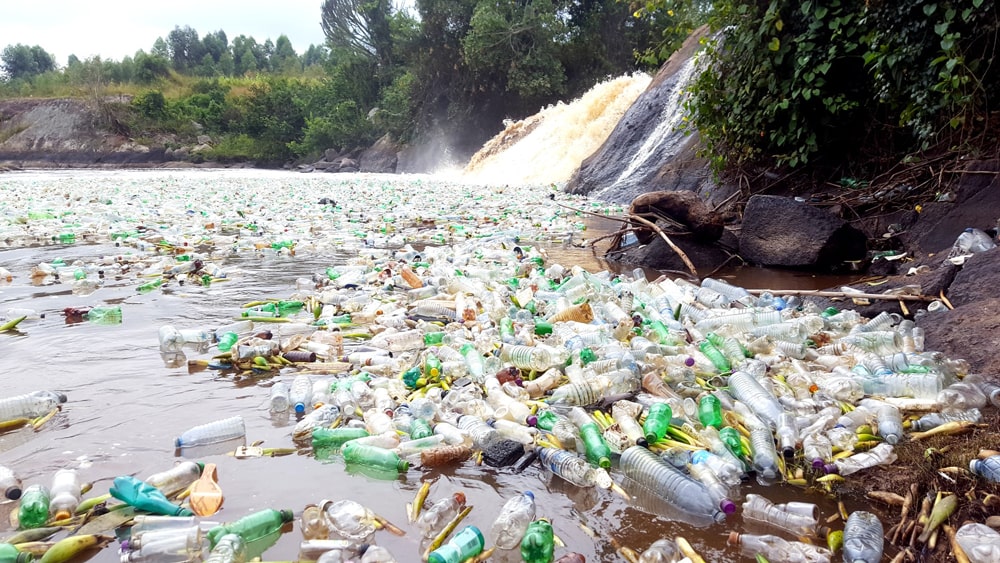
Beginning 2021, our team of youth leaders and volunteers followed River Rwizi for 3 months documenting the extent of plastic waste and which brands contributed to it. Our team analyzed situations at three major areas on River Rwizi namely Lugazi, Kateete falls, Nyamitonga bridge Area and Buremba village. Findings from this research concluded that River Rwizi is the most visibly damaged river by plastic pollution in Uganda and we decided that the world should know about this.
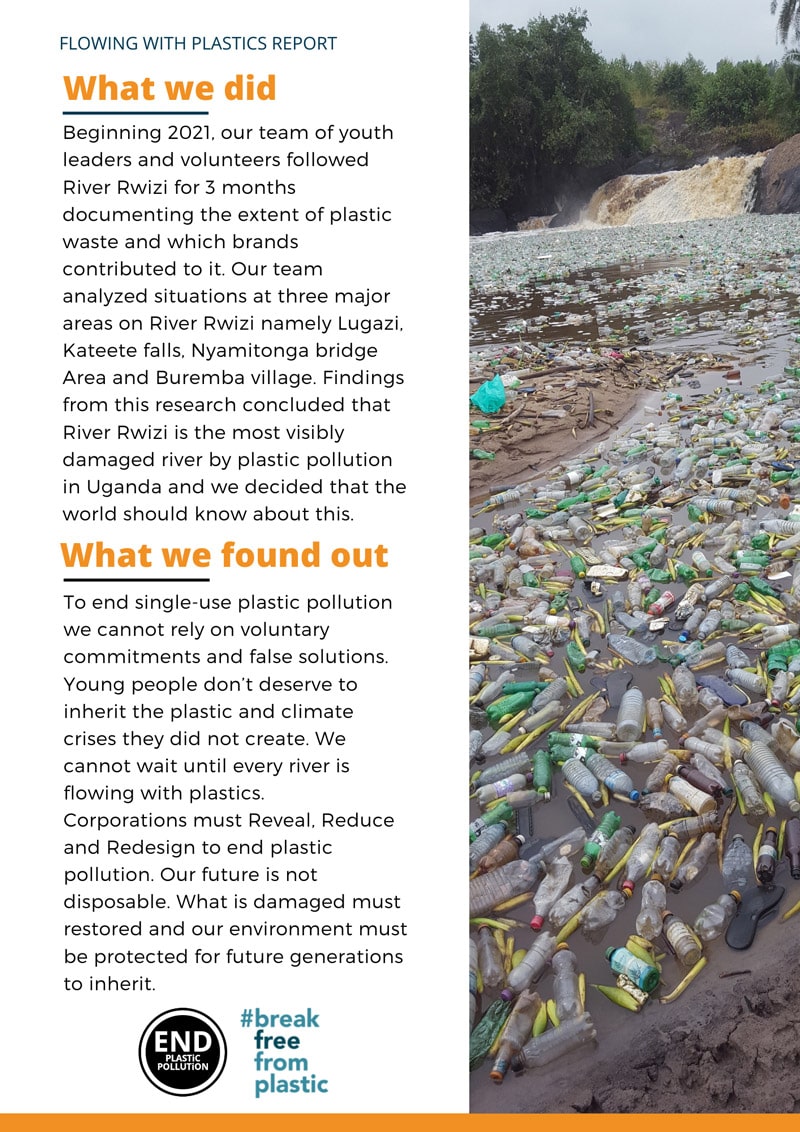
On December 2, 2021 we launched a campaign to save River Rwizi with the major aim to;
• To help people understand plastics, its impacts to people, planet and how to avoid single-use plastics.
• To call for community level, national and regional reforms around plastic use and manufacturing. Hold plastic polluters accountable and promote zero-waste circular economy systems.
• To promote learning, art and skills sharing among the youth.
• To promote awareness through local media for communities along River Rwizi.
These activities were conducted involving youth in community based activities including collective cleanups on River Rwizi and protests in Mbarara City. The cleanup on River Rwizi is the most risky cleanup we have ever conducted because of the heavy running water. Also, rising water levels the day before the cleanups posed a serious threat for many to drown. Nevertheless, we braved up and did a massive cleanup that was seen by over 56,100 people on Twitter, gaining over 188,162 impressions. We conducted a brand audit on all the waste collected from River Rwizi, 537 items were audited exposing 56 brands belonging to 36 companies.
Click here to read and download the Flowing With Plastics report
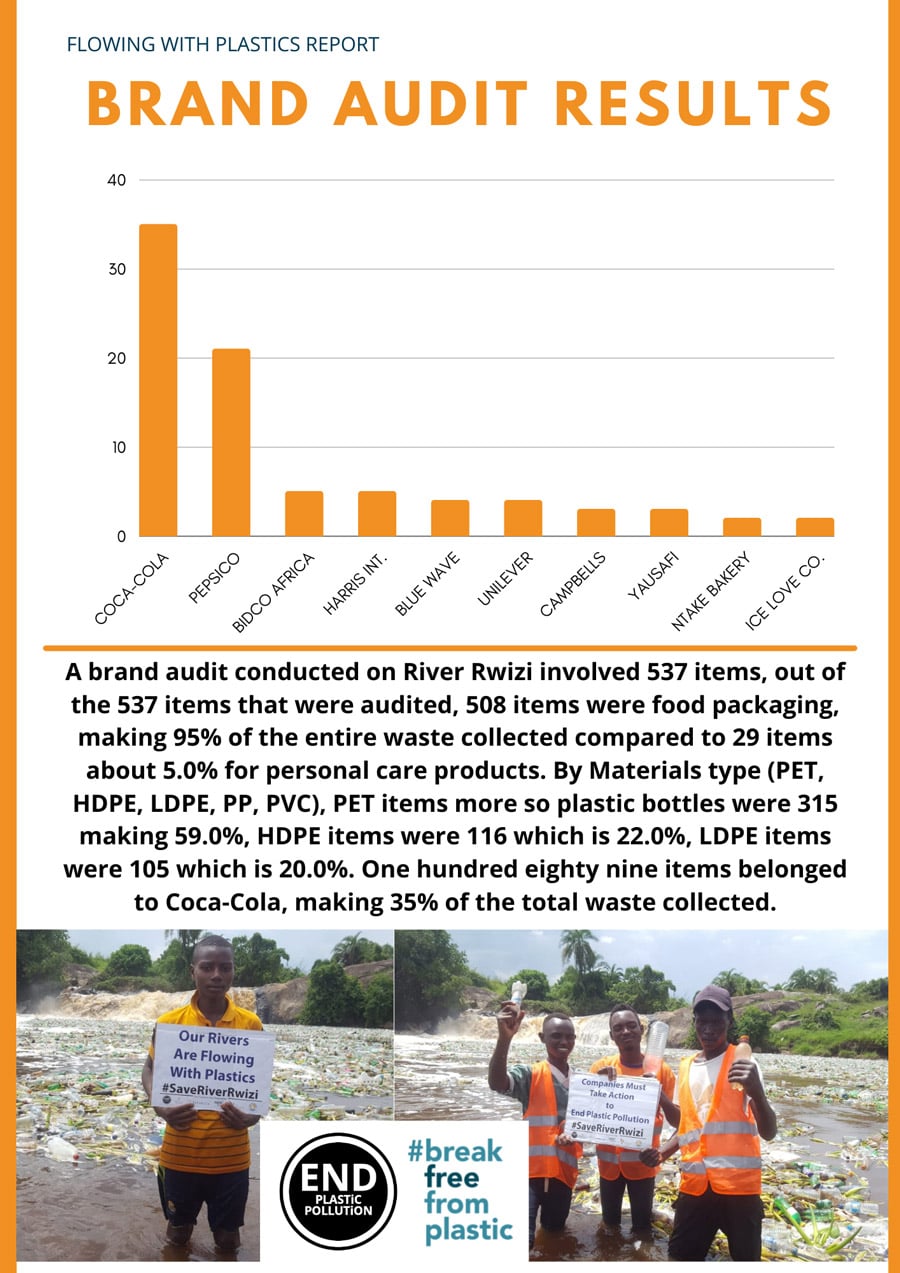
Our #SaveRiverRwizi, protest helped spread the message to the streets of Mbarara, where even youth skaters participated in several rounds around Mbarara City and joined a group of environmental activists, local waste pickers and students. We also launched a special program for youth waste pickers within Mbarara City and hosted trainings for youth about Circular Economy practices and collective efforts to manage plastic so that it does not end up in the river.
Through the #SaveRiverRwizi we engaged with 500 youths including 60 youth waste pickers, students from schools, universities, local leaders from Mbarara City’s Kateete Division, Buremba Village, and Mbarara City Corporate Business community.
At this point of reach by plastic waste, greater action and accountability by polluting companies is needed. Initiatives like Brand Audits are helping to expose these plastic polluting companies and hold them accountable.
Brand Audits are an action to document the names of companies that produced the plastic waste polluting our communities. This generates undeniable data that clearly informs the process of holding polluters accountable for the plastic and climate crises.
The Brand Audit on River Rwizi, 537 items were audited, involving 56 brands from 36 companies. One hundred eighty nine items belong to brands part of The Coca-Cola product family making 35.0% of the total collection.
The Uganda Brand Audit was conducted in Jinja Eastern Uganda at Masese Landing Site in partnership with Break Free From Plastic. 469 items were audited, belonging to 47 brands from 32 parent companies. The Coca-Cola Company is leading a pack of other top polluting multinationals including Unilever, The Campbell’s Soup Company and Upfield. To make matters worse, local / regional manufacturers are also making huge amounts of single-use plastics with the excuse that they are making consumer goods affordable and accessible for the poor. These include Yaket and Hema Beverages who are making cheap bottled water for as low as UGX 500. Also among the top ten plastic polluters are companies Mukwano Industries and BIDCO Africa, which produce products almost found in every home in Uganda.
The global Break Free From Plastic brand audit report also revealed that The Coca-Cola Company continues to be the world’s largest plastic polluter for the 4th year in a row. In 2021, The Coca-Cola Company was recorded to have produced more plastic products than the next top two polluters, PepsiCo and Nestle, combined.
It is no surprise that the company holds this position, The Coca-Cola Company is hugely investing in its expansion to make more single-use plastics to package its ever growing family of soft drinks brands. The Coca-Cola Company now makes over 4,000,000 plastic bottles per week - that is 200,000,000 plastic bottles per year in Uganda - but continues to promote false solutions under its “World Without Waste” initiative.
To end single-use plastic pollution we cannot rely on voluntary commitments and false solutions like The Coca-Cola Company’s “World without Waste” initiative. Among the commitments made by The Coca-Cola Company is to collect every bottle for every one sold, however this has failed. Young people don’t deserve to inherit the plastic and climate crises they did not create. We cannot wait until every river is flowing with plastics.
This is why this part one of Flowing with Plastics highlights the urgent need for eliminating single-use plastics by corporations like The Coca-Cola Company. In order to end plastic pollution, The Coca-Cola Company and other top polluters need to REVEAL their total plastic footprint, REDUCE the amount of plastic they produce, and REDESIGN their packaging for refill and reuse. Our future is not disposable. What is damaged must be restored and our environment must be protected for future generations to inherit.
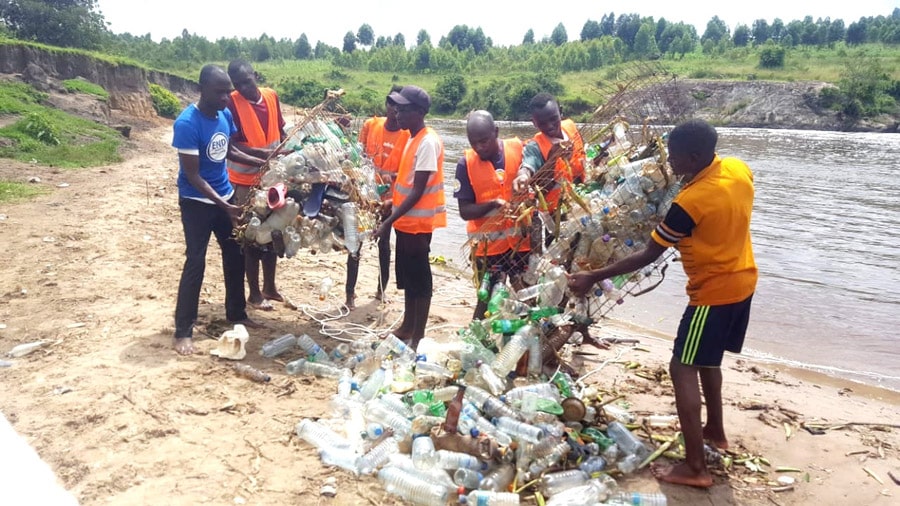
A cleanup on River Rwizi, 537 items were collected.
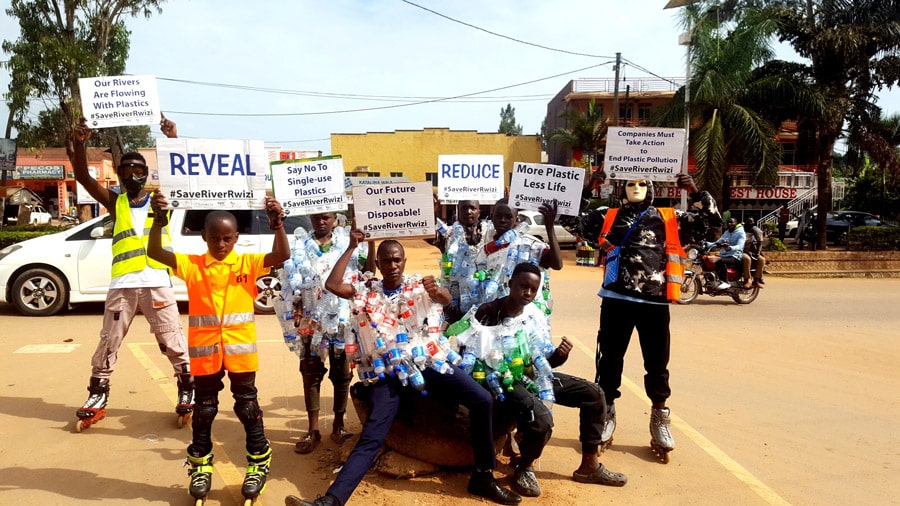
A protest in Mbarara Town to raise awareness about plastics polluting River Rwizi.
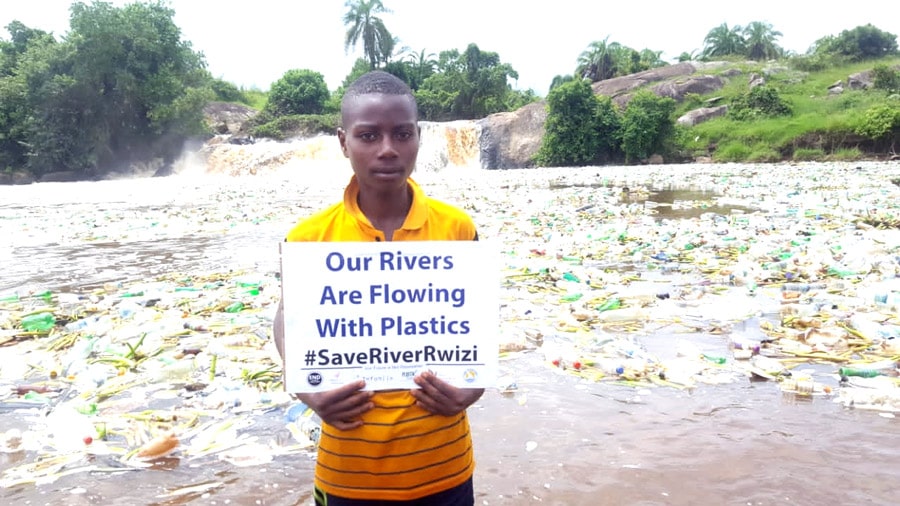
Ainebyona Martin, a youth from Mbarara was born in Buremba Village. His entire village survives on the water from the river for domestic purposes and for their cattle to drink. "The river was not like this while I sometime back, we used to come here with my friends to swim and fetch water for cooking food at home. My grandfather's cows and goats would come here to drink water but now it dangerous for them to drink this water". Says Ainebyoba while participating in the cleanup.
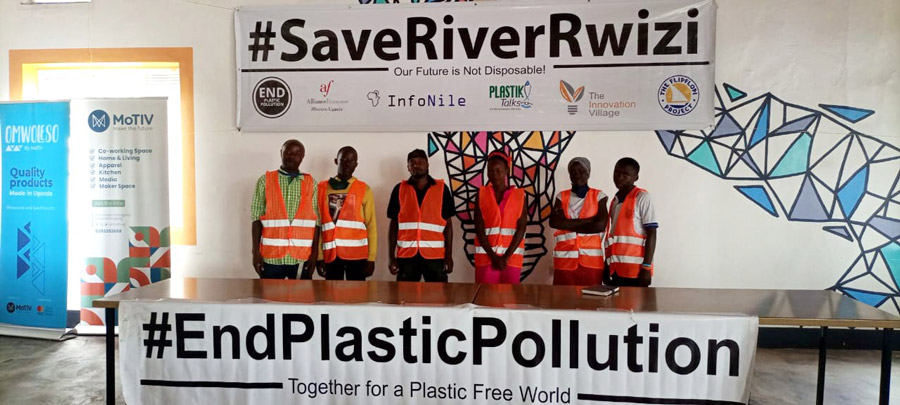
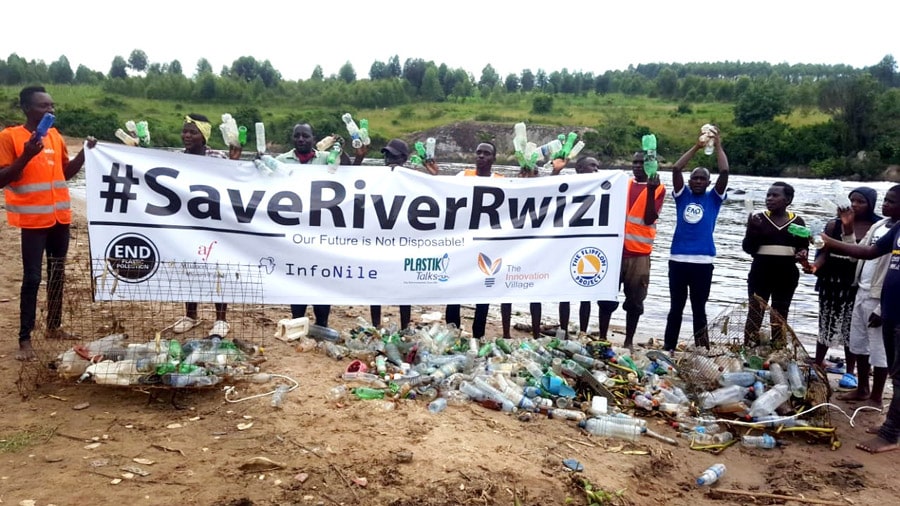
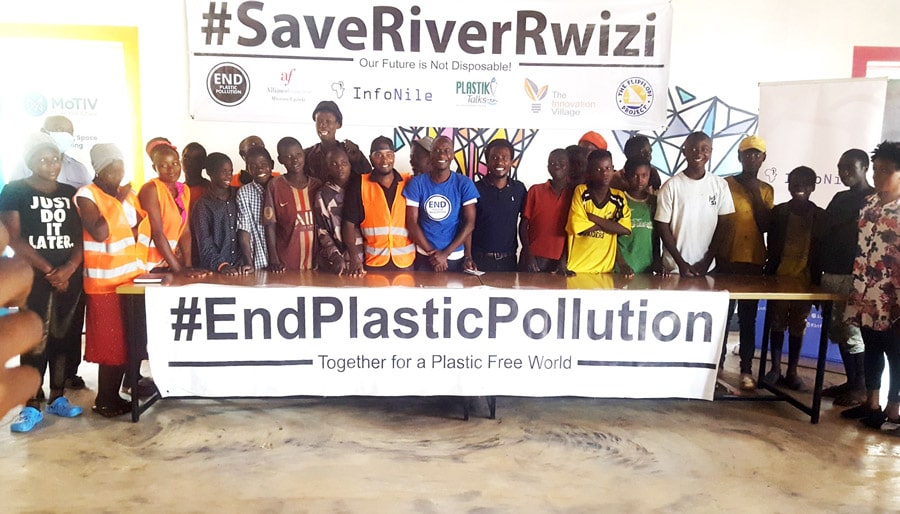
The Break Free From Plastic Youth Summit brought youth organizations together for a global virtual gathering on April 8-10, 2022. This served as a platform for youth to discuss revolutionary projects, to understand the intersectional issues on plastic, and to band together to map out their generation’s action plan to shift the world away from single-use plastic.
The first day of the summit focused on laying out the links of plastic to climate and environmental justice. Movement experts helped participants gain an understanding of all the ways plastic affects communities big and small, and how each person living on this planet is connected to this crisis. The workshop sessions gave a chance for youth leaders to compare the ways in which plastic affects their communities, countries, and themselves.
Day two of the summit gave participants a chance to hear from young leaders like themselves, who have led successful campaigns in their own communities that eventually scaled up into national projects with other like-minded youth organizations. Participants were given a chance to discuss the framework of these projects and what they thought would be important to prioritize in their own local context.
The last day of the summit marked the launch of A Mighty Ocean, the documentary created by the BFFP Youth Ambassadors of 2021. Six youth ambassadors from Indonesia, India, Ghana, and Brazil gave participants a glimpse of how they personally experience climate change, and showed their stance as youth leaders who are demanding change from plastics producers and policymakers.
This session was followed by the youth manifesto co-design session, where participants drafted the action plans they are committing to as a global BFFP Youth Movement.
This group of young leaders are largely concentrated in the Global South, with the majority of participants from Asia-Pacific, Africa, and Latin America. They are a portion of the largest generation of young people that are most impacted by climate change, and are the ones left to clean up the plastics crisis from decades of neglect of generations before them. This is the first gathering from BFFP that aimed to unite young leaders that are at the forefront of the plastics and climate crisis, to support the plans that they want to see within and outside the movement, and give the chance to collaborate with others.
Nina Azzahra, Co-captain of River Warrior Indonesia, said: “Before the 1980s, people bought products in tin, glass, paper, and cardboard. Very little products were packaged in plastic, and they were not created for single-use. So people did not produce much trash then. My mom told me that when she studied in school, her canteen would only sell fresh snacks and drinks, made by the sellers themselves.There is no styrofoam, straws, or plastic bottles. They use reusables. So we need to go back to those times where there are no sachets being sold in schools. Sachets are now littering our rivers, our seas, our beaches, and our roads, because industries produce too many sachets. It is not recyclable, especially the multi-layer ones.”
Alex Ben Ghanem, Data Analyst at United We Dream, said: “I started learning more and more that there was another aspect to this. I think that what truly drove my passion was the colonial aspect. That not only, was the world going to shit, as some would say. But there are clear perpetrators, and they don’t look like me. They don’t look like many people in this room. They are usually white folks. They are the colonizers that established the world order that we live in today, and forced us to consume plastic goods, forced us to consume fossil fuels, forced us to conform to a system that if we don’t, we’re either kicked out of the system or forcibly annexed in the system.”
Nikhilesh Paliath, Co-Founder & Senior Mentor, Green Army International, said: “When students started to go and campaign, they had so much energy. People listened to the students and that’s when cities and civil society organizations like Thanal, realized that students have much bigger power in communicating with people. People don’t say no to students. Even when students argue with residents about waste management practice, they listen to them. So we understood that students had much more communicating power, and that’s when students started getting more involved with our campaign.”
Betty Osei Bonsu, Project Coordinator at Green Africa Youth Organization, said in the global youth documentary: “Only a few people cannot make it. We need more people to come onboard. Little drops of water, they say, makes a mighty ocean. We need more youth, we need more voices, to actually campaign for the better environment we want to see.”
The Break Free From Plastic Youth Summit marks the beginning of the collaboration of young people in a wider range of countries who are representing their generation’s stance and action plans on the plastic pollution crisis. Their drafting of the youth manifesto serves as a guide for strategized action within and outside the BFFP Movement.
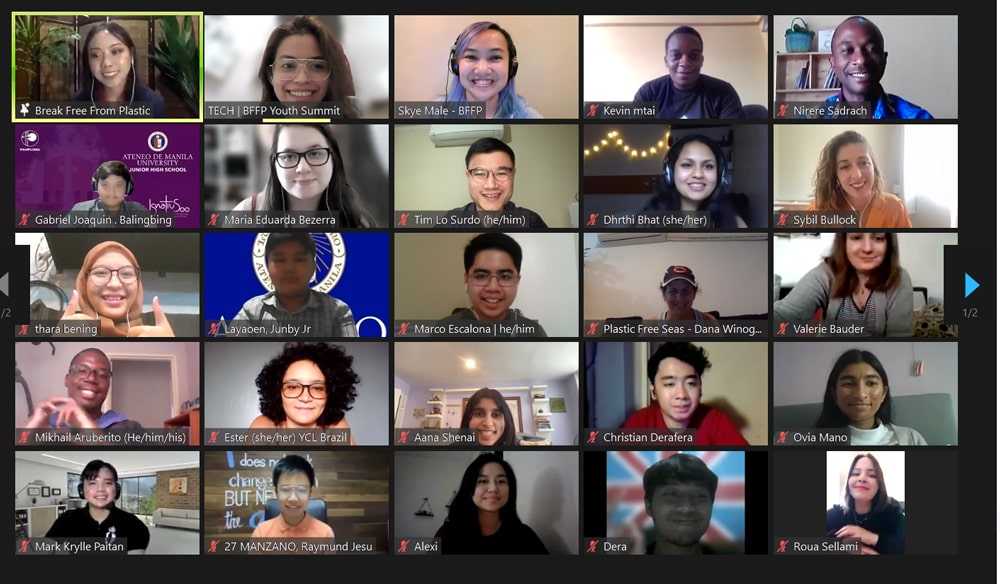
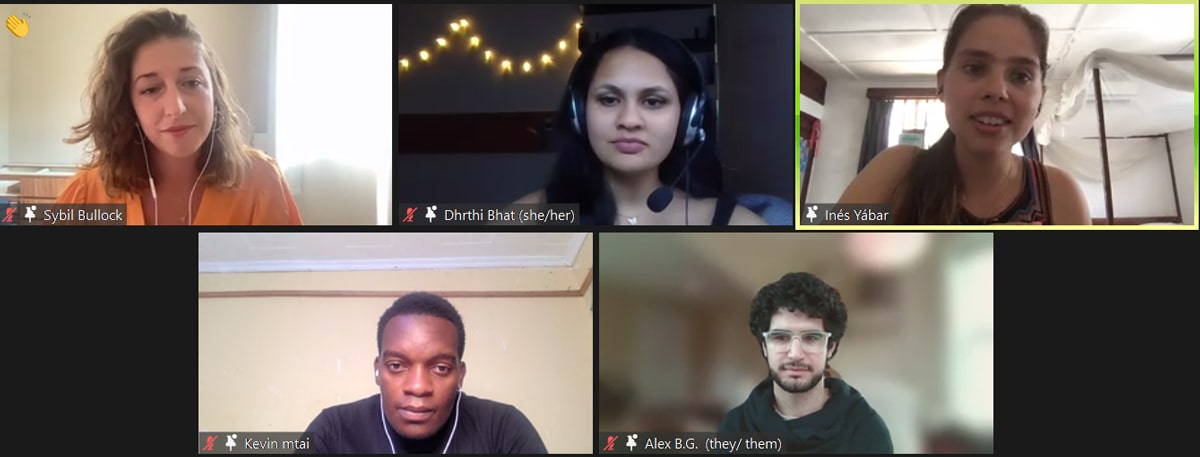
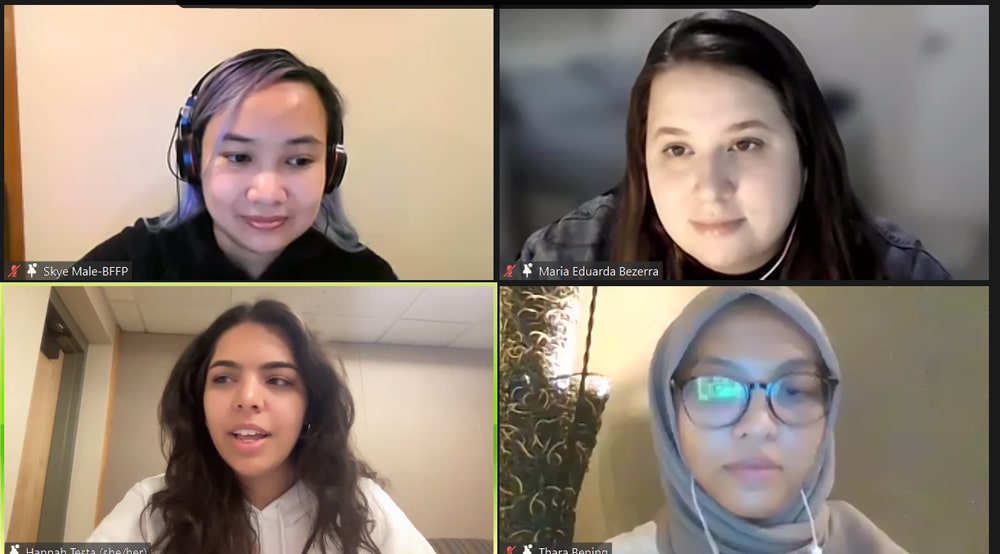
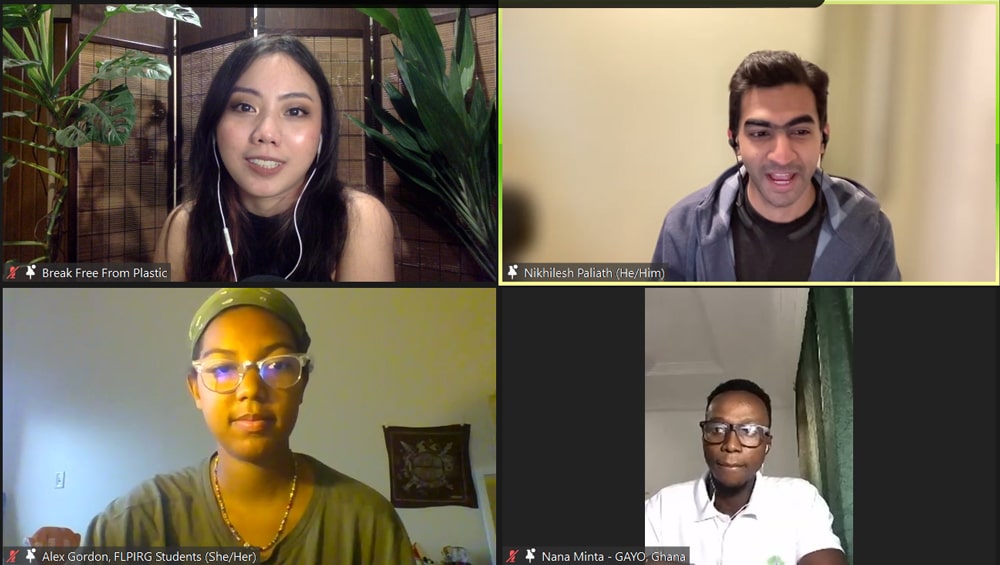
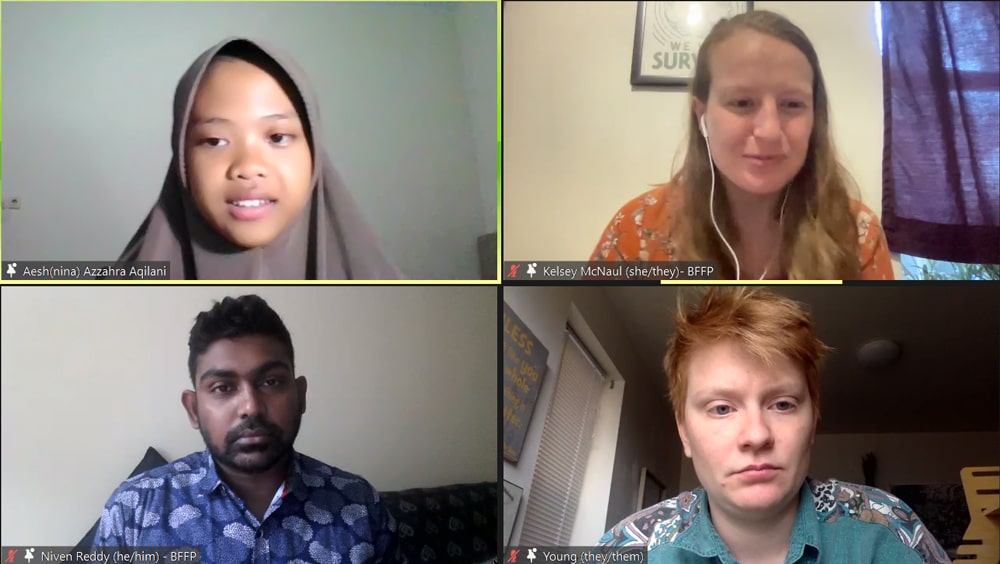
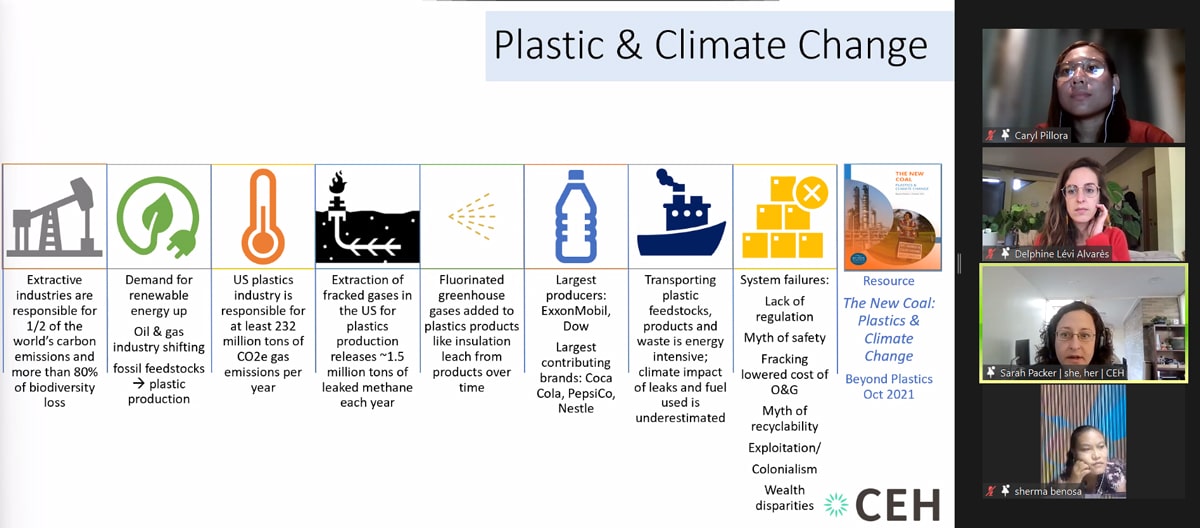
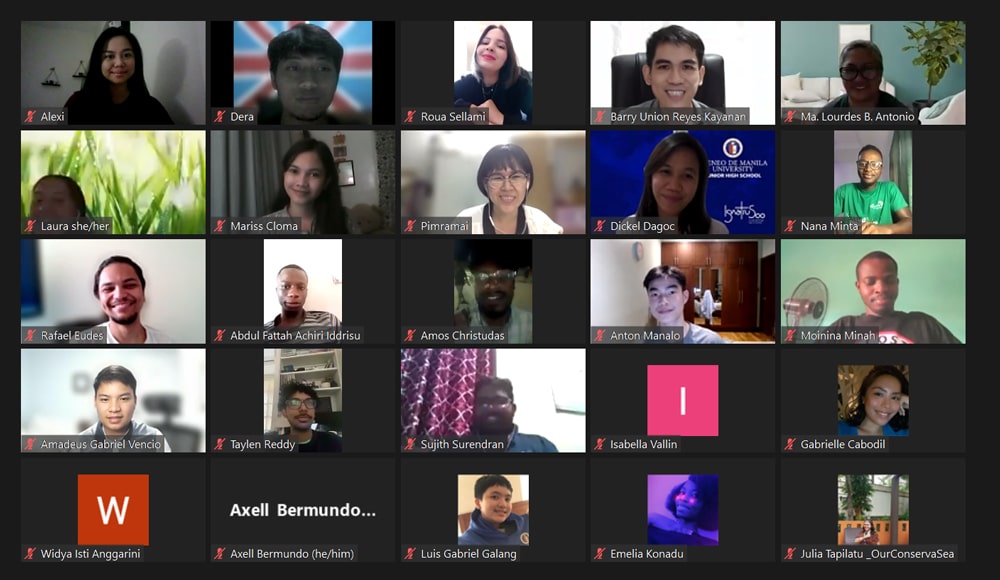
Relevant Links
• A Mighty Ocean (Short Documentary Film)
• BFFP Youth Ambassador Recruitment
• Youth Manifesto
• Summit and Panel Pictures
Event Recordings <note to web admin: please embed the links to the text>
• Day 1 - April 8th
• Day 2 - April 9th
• Day 3 - April 10th
Leading Organizations
ReUni, CirculaCT, UFSC Plastic-free, Green Africa Youth Organization, Bring Back Green Foundation Kerala, Environmental Green Society Malang, Network of Woman Action to Save the Earth (NOWASTE), River Warrior, Zero Waste Youth Negros Oriental, Zero Waste Youth Romblon, Student Council Alliance of the Philippines, Pour Une Tunisie Propre et Verte
Supported by
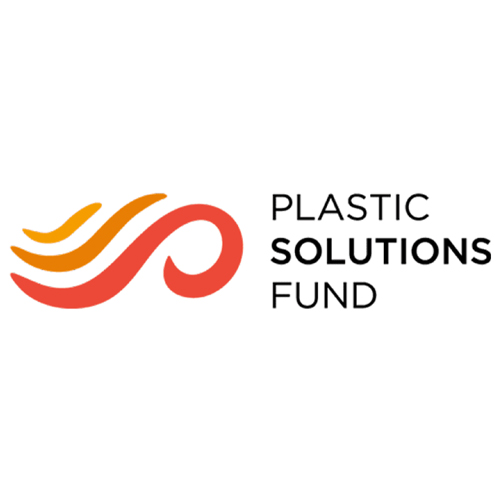
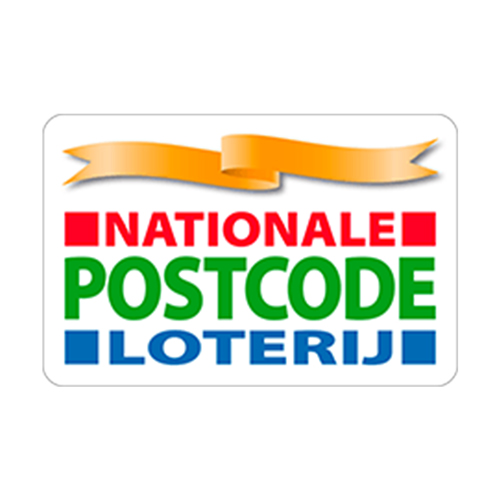
Manila – The Dutch Postcode Lottery has awarded a grant of €500,000 to #breakfreefromplastic (BFFP) in support of a project to accelerate the change towards a future free from plastic pollution.
The grant, which was made possible through the sponsorship of Greenpeace Netherlands, is expected to boost #breakfreefromplastic’s capacity to coordinate and support globally impactful campaigns and initiatives including the annual global Brand Audits, the Zero Waste Academy, and the work of BFFP’s Youth Ambassadors. The grant will also help increase the movement’s operational efficiency, and amplify its impact to expose the drivers of plastic pollution globally while mainstreaming solutions and strengthening the movement.
“Our movement welcomes this generous donation from the Dutch Postcode Lottery that was made possible by its participants. It will give our work a significant boost, especially at this crucial time when the world needs to redouble its efforts to address the twin emergencies of climate change and plastic pollution,” said Von Hernandez, BFFP Global Coordinator.
Plastic pollution is inherently linked to the key challenges undermining our planet and its people. Climate change is expected to worsen through continuing plastic production and pollution, given that 99% of plastics produced today are derived from fossil fuels. Plastics also intrude on human rights through each step of the plastics lifecycle - extraction (oil and gas), production (of plastic pellets and plastic products), trade and plastic use, waste/disposal, and marine pollution. Vulnerable populations - primarily in the global south - bear a disproportionate burden of the impacts of plastic pollution, as evidenced by the continuing cases of plastic waste dumping by industrialized countries on poorer countries, often in the guise of recycling. Plastics also present profound impacts on human health, given the widespread and almost unregulated use of persistent and toxic chemicals in plastics production and use, with associated pollution impacts on air, water, and land.
BFFP works to create systemic change to break this cycle of pollution, and promote solutions, applying pressure on corporations and governments to abandon polluting practices and adopt progressive policies to eliminate single-use and throw away plastic. More specifically, BFFP challenges responsible parties and stakeholders to focus on reduction strategies, including product redesign and alternative delivery systems (e.g., reuse and refill models).
The Dutch Postcode Lottery has been raising funds since 1989 to support organizations and charities working towards a greener and fairer world. It provides grants and core support to organizations worldwide working in the areas of poverty alleviation, human rights, nature conservation, the environment as well as social cohesion in the Netherlands. The donations are made possible through the contributions of more than 3 million participants of the Dutch Postcode Lottery. Since 1989, the lottery has donated more than 7.1 billion euros to hundreds of charities and social initiatives worldwide.
Manila - Today, the Ellen MacArthur Foundation (EMF) released a new report entitled “Flexible packaging: The urgent actions needed to deliver circular economy solutions”, which focuses on flexible packaging as the fastest-growing plastic packaging category. This form of packaging is almost uniformly single-use, with high rates of leakage into the environment and very low recycling rates.
Sachets—small sealed packages used to distribute goods in small quantities, which are often made of multilayered single-use plastics–are a particularly critical environmental problem. In fact, the 2020 #breakfreefromplastic Brand Audit identified sachets as the most prevalent plastic waste item found in clean-ups and waste audits globally.
According to EMF, fast-moving consumer goods companies are responsible for distributing more than 146 billion plastic sachets per year in Southeast Asia alone to deliver personal care and home care products. Although sachet pollution is particularly bad in Asia due to corporations’ packaging standards in the region, they are also discarded in the form of to-go condiment packages throughout the global north and in other forms around the world.
Many corporations that sell sachets have joined the Ellen MacArthur Foundation New Plastic Economy Global Commitment to have 100% of their packaging recyclable, reusable, or compostable by 2025. However, Nestlé, Unilever, and other corporations that have regularly figured as top polluters in #breakfreefromplastic’s Brand Audits, continue to rely on this highly-polluting mode of product delivery. Due to the use of multiple materials and toxic additives, plastic sachets and pouches are inherently difficult and expensive to safely manage and recycle—costs which local governments and taxpayers often end up paying for. In some cases, corporations using the guise of plastic offsetting, tap waste pickers to collect and transport sachets to cement kilns where they are ultimately incinerated—a practice the EMF report describes as “not desirable” in a circular economy.
Among the 21 specific and urgent actions proposed in the report, the EMF recognizes the need for the direct elimination of unnecessary flexible packaging, and the need to innovate reuse and refill systems to replace the need for sachets, while exposing the inherent limitations of "chemical recycling" that the industry uses to justify the continued production of single-use plastic.
Member organizations in the #breakfreefromplastic movement have been working to address the pollution caused by flexible packaging and demand real solutions and accountability:
Christie Keith, International Coordinator of Global Alliance for Incinerator Alternatives (GAIA) , said:
"It is clear from this report that so-called 'chemical recycling' is more trouble than it's worth– namely the 50-70% material loss, high costs, and the fact that most operations surveyed are either commercially defunct or actually just burning plastic, a major climate threat. Big brands and investors should take note: investing in chemical 'recycling' is throwing money away that could be spent on real solutions like reuse systems. Chemical 'recycling' must be revealed for what it really is, an industry fig leaf for more single-use plastic production."
Lakshmi Narayanan, Co-founder of SWaCH Cooperative Pune, a waste picker cooperative said:
“Addressing challenges to handling unnecessary flexible packaging will benefit the informal waste sector, as these materials have lower value compared to other packaging materials. While improved collection and recycling infrastructure are critical, governments and corporations should put emphasis on the role of the informal sector, instead of relying on centralized or token investments, to ensure that they're properly incentivized and not merely internalizing the cost of handling low-value flexible materials.”
Marian Ledesma, Zero Waste Campaigner from Greenpeace Southeast Asia - Philippines, said:
“This latest report underscores how big brands have unleashed a scourge of plastic pollution on communities and their environment, particularly in the form of sachets which are impacting the lives of the most vulnerable. We need big brands like Coca-Cola, PepsiCo, Nestlé, and Unilever to end their addiction to plastic packaging and match the gravity of this crisis with concrete solutions. We call on Coca-Cola, PepsiCo, Nestlé, and Unilever to focus their efforts on reduction and to switch their business models to refill and reuse systems instead of investing in false solutions like chemical recycling, co-processing or bogus recycling schemes which will not solve this crisis.”
Miko Aliño, Project Coordinator for Corporate Accountability from #breakfreefromplastic, said:
“We welcome the Ellen MacArthur Foundation’s call for the elimination of multilayered flexible packaging and agree with its urgency. Every day, we witness how sachets are destroying natural resources and affecting the livelihood of communities across Asia. These communities are tired of hearing empty promises from corporations while seeing no real progress. So it is imperative that these companies take meaningful and urgent action to quit sachets.”
Press Contacts:
· Asia & the Pacific: Jed Alegado, Jed@breakfreefromplastic.org
Eah Antonio, Eah@breakfreefromplastic.org
· Europe: Bethany Spendlove Keeley Bethany@breakfreefromplastic.org
· United States: Brett Nadrich, Brett@breakfreefromplastic.org
· Global Press Contact: Caro Gonzalez, Caro@breakfreefromplastic.org
When the #breakfreefromplastic movement was founded, its members around the world vowed to mobilize around a common vision of a world free from plastic pollution. A key tool for achieving that vision was the development of brand audits, a citizen science initiative to record and expose the names of the companies trashing communities with their single-use plastic. Our first global brand audit was in 2018, and since then over 100,000 volunteers across six continents have powered this collective effort to pressure corporations to end plastic pollution for good.
Our brand audit leaders know all too well that no matter how hard we try as individuals to avoid single-use plastic and recycle whenever possible, it will unfortunately never be enough. Companies undermine these well-intentioned individual and community efforts by continuing to extract fossil fuels to manufacture ever more plastic packaging. That’s why we use brand audits to gather the data needed to shine the spotlight on the companies fueling this single-use plastic boom. Thanks to our global brand audit initiative and annual reports, we have been urging the top polluting companies to move towards real solutions like refill and reuse systems that eliminate the need for single-use plastic packaging altogether.
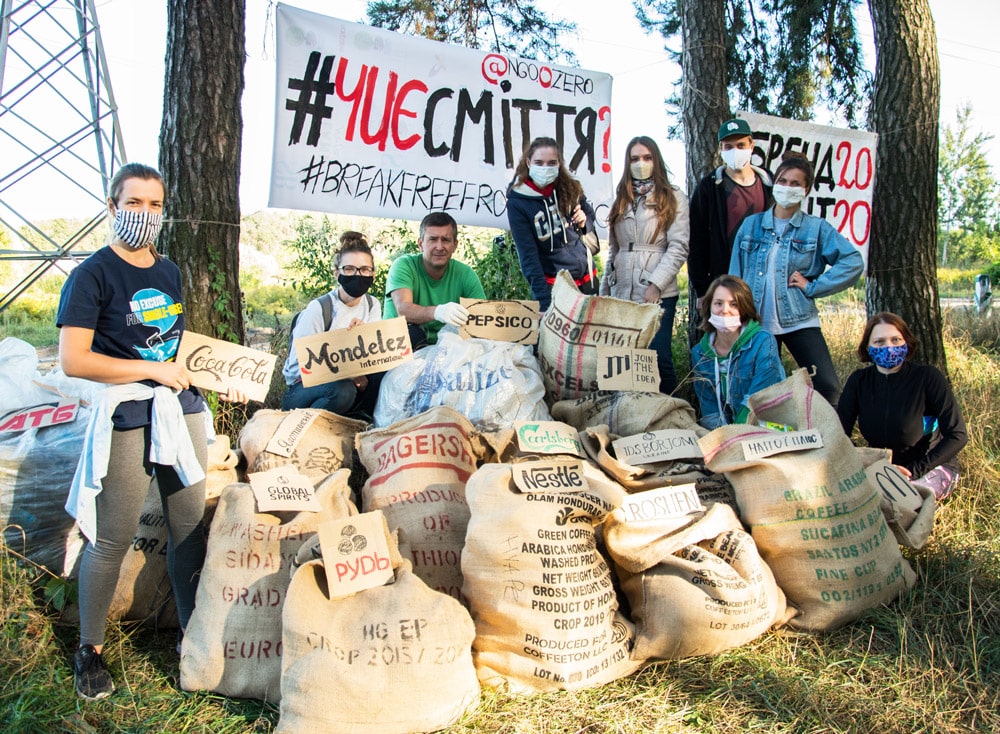
Photo Credit: NGO Zero Waste Society Ukraine/2020
In 2022, we are entering our 5th year of mobilizing brand audits. This is an opportunity to reflect on what we have accomplished together thanks to the leadership and hard work of the BFFP movement’s brand audit leaders around the world.
Here are three big reasons to celebrate brand audits and the people who organize them!
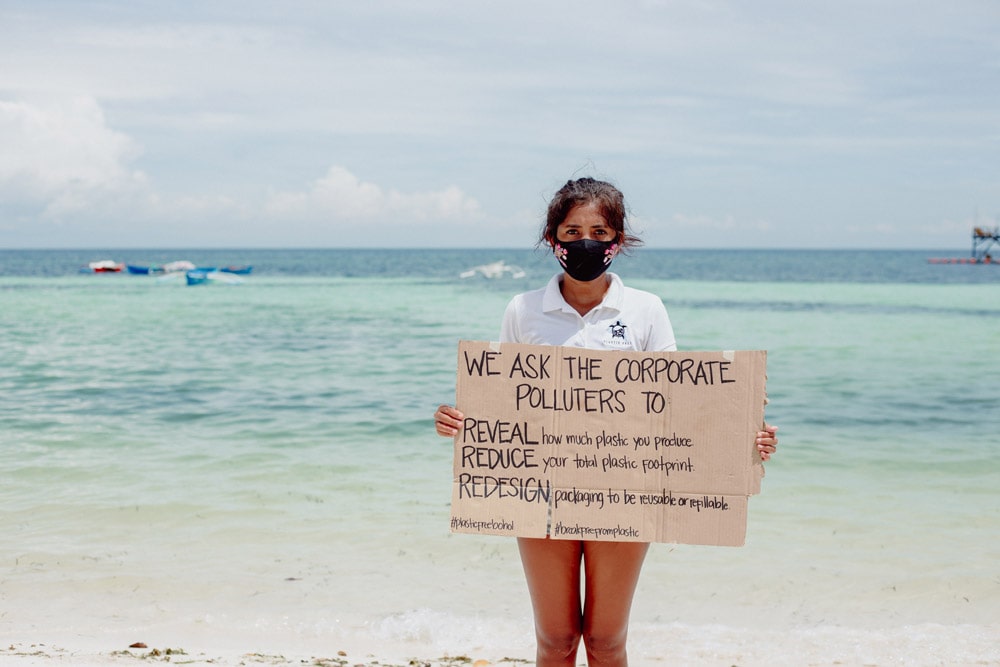
Photo Credit: Plastic Free Bohol/2020
In February 2022, The Coca-Cola Company announced a new voluntary goal of 25% reusable packaging by 2030. With cautious optimism, for the thousands of participants who have conducted brand audits this is a major step in our campaign challenging fast-moving consumer goods (FMCG) companies to invest in reuse and refill systems to tackle the climate and plastic crisis. The Coca-Cola Company has consistently been the world’s top plastic polluter since the beginning of our data collecting efforts. Our 2021 global brand auditors found nearly 20,000 Coca-Cola branded products, representing more pollution than the next two top polluters combined—as has been the case every year since 2019.
This new reuse commitment does not mean our work is over - far from it - but it does mark an important milestone. Until now, The Coca-Cola Company’s sustainability efforts had focused primarily on end-of-pipe collection,numerous cleanup projects and even selling plastic bottles made out of ocean plastic pollution they helped create. Previous statements from key Coca-Cola Company staff had framed plastic pollution as primarily a “consumer littering” problem, and touting recycling as the ultimate solution.
In the new Coca-Cola announcement, the company now acknowledges reuse as an effective way to reduce carbon emissions, a major shift after years of industry advocating that reuse would have higher carbon emissions. “Reusable packaging is among the most effective ways to reduce waste, use fewer resources and lower our carbon footprint in support of a circular economy,” said Ben Jordan, Senior Director, Packaging and Climate of The Coca-Cola Company (2022). Just a few years ago, this kind of statement coming from the world’s largest FMCG company would have been unthinkable. More and more companies are waking up to the benefits of reuse and we hope to see many more commitments in the near future.
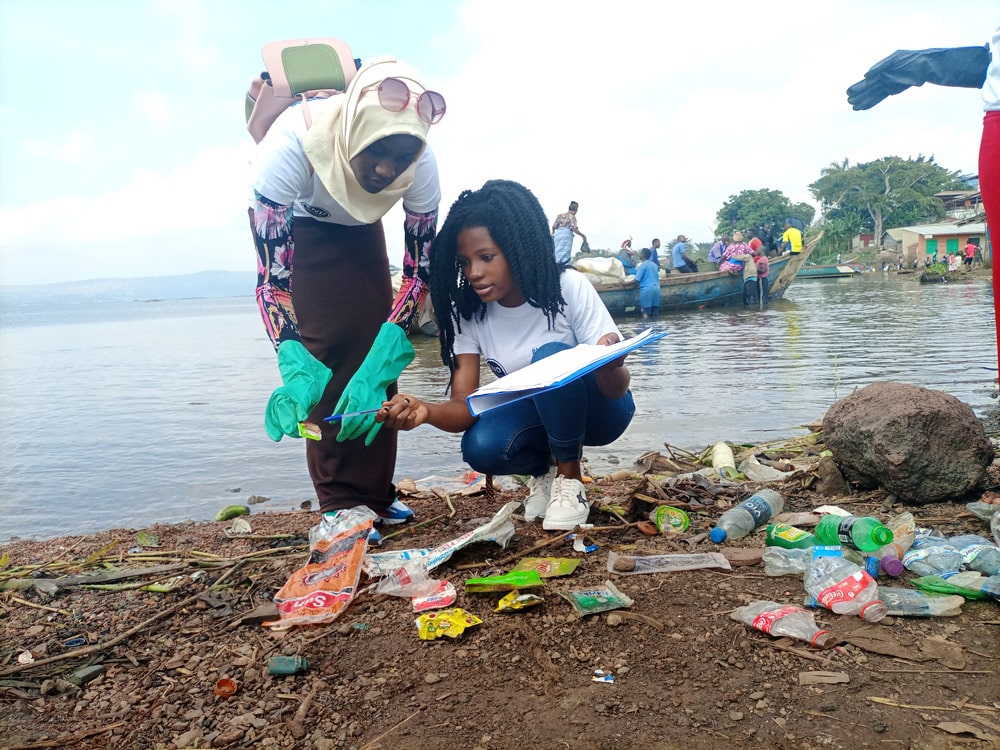
Photo Credit: End Plastic Pollution Uganda/2021
Thanks to the incredible work of brand audit leaders around the world,we have held FMCG companies accountable for their plastic pollution through our annual global reports, several films, and BFFP members’ own brand audit reports. These combined efforts are changing the story about plastic pollution, catalyzing conversations about its real causes and fueling efforts to create real solutions.
Our annual brand audit report has earned news coverage in major international media outlets like The Guardian, CNN, BBC, Le Monde, Reuters, and many more. All this media attention successfully amplifies the call for corporate polluters to take responsibility for plastic pollution and influences the dominant plastics narrative around the world. It is now the norm to see The Coca-Cola Company, Nestlé, PepsiCo and Unilever to be labeled ‘a top plastic polluter’ in any news story about them. Since we began gathering data in 2018, BFFP’s brand audits have been mentioned in 500 media articles written in over 30 different languages! In addition to the annual global BFFP brand audit report, over a dozen BFFP members and allies have published brand audit reports of their own. By doing so, they are strengthening our collective impact at the local and national level, influencing policy makers and demanding corporate accountability at the national level. There are now country brand audit reports in Bangladesh, Belgium, Brazil, Denmark, India, Indonesia, Kenya, Mexico, Nigeria, Philippines, Sri Lanka, Tanzania, Uganda, UK, USA, Vietnam - and more coming soon!
In addition to our global and member-led reports, we also have shared our brand audit findings in films. The #breakfreefromplastic movement’s documentary, The Story of Plastic, features brand audits and recently won an Emmy award! In 2020, we collaborated with waste picker groups to conduct brand audits and co-produced a short film, Not Disposable: Waste Pickers. This film put waste pickers in the spotlight to directly call out the corporations challenging their livelihoods. In 2021, BFFP co-launched with BBC Panorama’s new documentary, Coca-Cola’s Billion Bottle Problem, which featured BFFP leaders, brand audits, and our 2021 data results naming The Coca-Cola company as #1 top polluter. The day after this film aired, UK prime minister Boris Johnson echoed our key messages and publicly shamed Coca-Cola as a top plastic polluter!
View this post on Instagram
Brand audit led by youth organizers in Rio de Janeiro, Brazil.
BFFP members have used brand audit data to pass bans on single-use plastic, create zero waste communities and plastic-free schools, file lawsuits, and advocate for policy change through Extended Producer Responsibility (or Polluter Pay initiatives) and Deposit Return Systems. In big and small ways, brand audit data is a powerful tool to change systems - whether a small campus community, an island, or an entire country or company. Here are just a few examples!
Global Plastic Treaty: BFFP Youth Ambassador, Rafael Eudes, organized brand audits along Copacabana Beach in Rio de Janeiro in February 2022 to pressure the Brazilian government to support a global plastics treaty at UNEA 5.2!
Lawsuits: Citing brand audit data, BFFP member organizations in the USA have filed three different lawsuits in 2021 alone against top polluter The Coca-Cola Company for public nuisance and defective product liability, false and deceptive advertising, and misleading consumers on plastic bottle recycling.
Bans: On the island of Mindanao in the Philippines, local organizers with Interfacing Development Interventions for Sustainability (IDIS) and Bantay Bukid hosted a brand audit in the Panigan-Tamugan watershed - one of the main sources of clean drinking water - in Davao City as part of a national month-long Zero Waste celebration. The group announced their brand audit data results and used the media attention to apply pressure to the Davao City council to pass the “No to Single-Use Plastic Ordinance” in March 2021.
Plastic-Free Campus: Alex Gordon, a student at Eckerd College in Florida, USA, conducted brand audits three years in a row and used the results to urge her school administrators to sign the plastic-free campus pledge. And it worked! Marshall University in West Virginia as well as Zero Waste Youth Negros Oriental in the Philippines also used their brand audit results to convince their campus president to sign the pledge to become a Plastic-Free Campus.
Extended Producer Responsibility: In May 2018, over 15,000 volunteers conducted waste and brand audits in 250 sites across India to “Beat Plastic Pollution” for World Environment Day. With India as the global host, 10 GAIA member organizations coordinated brand audits in 15 different Indian cities to identify the top corporate polluters using Break Free From Plastic methodology. In Thiruvananthapuram, the capital of Kerala in India, one brand audit in particular led to some exciting solutions. Local NGO Thanal audited 75 households for three weeks, and then presented the data results to the municipal authorities to demand the top polluting brands set up alternative delivery systems. Thiruvananthapuram is a success story that stands out for its municipality’s commitment to demand corporate accountability for waste.
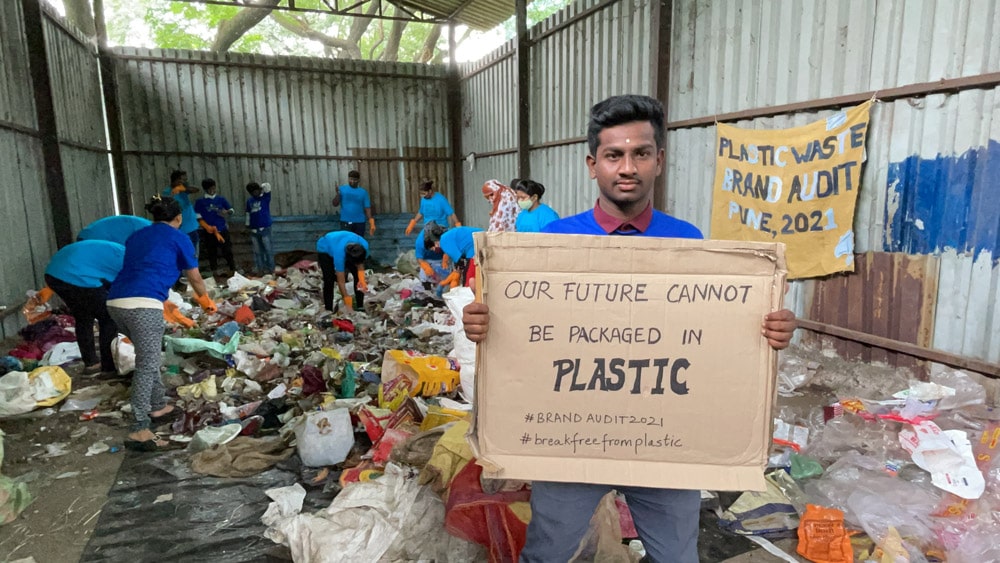
Photo Credit: SWaCH/2021
In less than five years, BFFP members have made significant impacts by mobilizing their communities around the world to stand up to corporate plastic polluters and demand real change through brand audits. Over 100,000 people have participated in this global campaign to organize over 1,500 brand audit events in 55 countries. Together, we have built a plastic pollution database numbering over one million cataloged plastic waste items globally. These brand audits have changed the way we think about plastic pollution, and what we - and companies - can do about it. When you record brand audit data, you are directly challenging FMCG companies to create a plastic-free future. Now that’s something to celebrate!
View this post on Instagram
Our friends at Trash Hero know how to have fun with their brand audit dance!
Thank you to our brand audit community leaders and every single participant around the world who has joined in this collective effort to hold corporations accountable for their plastic waste. Let’s see what we will achieve together in 2022 and beyond!
Learn more about BFFP’s brand audit and get involved here.
Manila/Bangkok/New Delhi (February 24, 2022) — More than two hundred environmental groups belonging to the Break Free From Plastic movement in the Asia-Pacific region are urging their respective governments to support the call towards a new binding legal instrument that will cover the entire life cycle of plastics and is not limited to “marine litter”.
A recent poll covering 20,000 people across 28 countries has indicated that three in four people want single-use plastics to be banned as soon as possible. The poll is relevant in the run-up to the member states of the United Nations gathering in Nairobi, Kenya for the 5th United Nations Environment Assembly (UNEA 5.2) from February 28 - March 2.
Associate Professor Trisia Farrelly of Massey University’s Political Ecology Research Centre (NZ) said:
“We need a legally binding treaty with a scope that extends beyond marine litter to capture the full life cycle of plastics including extraction, production, manufacture, distribution, consumption, management, and ecological and biological contamination. But the primary goal of the treaty must be prevention. The tap can most effectively be turned off by capping virgin plastics while simultaneously designing plastics and their associated toxic chemicals out of the circular economy wherever possible. The intergovernmental committee responsible for negotiating the treaty will need an open mandate to enable it to appropriately respond to the latest scientific evidence; local and traditional, responses, knowledge, innovations, and practices; and emerging risks and challenges.”
Satyarupa Shekhar, the Asia-Pacific Coordinator of Break Free From Plastic said:
“We can no longer delay actions on addressing the root causes of the plastic pollution crisis. The treaty and the national action plans should not rely on voluntary or corporate-led programs, such as the Extended Producers’ Responsibility (EPR), plastic pacts, or plastic offsetting schemes. These are greenwashing efforts whose primary purpose is to prevent effective regulation and delay action to resolve plastic pollution at source, while doing little to prevent accelerating plastic pollution production and its multiple, long term impacts along the entire plastics supply chain.”
Joe Athialy of Centre for Financial Accountability (CFA), India said:
“We need long-term and drastic reductions in the scale of plastics production, eliminating toxic plastic additives, and pollution. Moreover, plastic is a toxic carbon. We can fully fight the scourge of this environmental and climate crisis through a legally binding treaty.”
From February 21-25, in the run-up to the UNEA 5.2, the National Hawkers’ Federation (NHF) took to the streets in over 15 cities in 9 states in India, for a series of demonstrations calling upon the Indian government to sign the Global Plastics Treaty. The NHF works actively with street vendors across the country, fighting for their rights and recognition. Supporting the Global Plastics Treaty would ensure that street vendors have alternatives to plastic, can stem the flow of disposals into terrestrial and aquatic ecosystems, and help curb the impacts on human health and biodiversity.
Basel Convention - plastic waste crisis
In 2019, 187 countries took a major step in curbing the plastic waste crisis by adding plastic to the Basel Convention, a treaty that controls the movement of hazardous waste from one country to another. The amendments require exporters to obtain the consent of receiving countries before shipping most contaminated, mixed, or unrecyclable plastic waste, providing an important tool for countries in the Global South to stop the dumping of unwanted plastic waste into their country.
After China banned imports of most plastic waste in 2018, developing countries, particularly in Southeast Asia, have received a huge influx of contaminated and mixed plastic wastes that are difficult or even impossible to recycle. Norway's proposed amendments to the Basel Convention provides countries the right to refuse unwanted or unmanageable plastic waste.
China’s decision reflects a growing recognition around the world of the toxic impacts of plastic and the plastic waste trade. The waste situation in Asia-Pacific has been exacerbated by sachet waste and other non-recyclable plastic discards largely circulated by multinational corporations, including those that are illegally dumped here by developing countries such as Japan, US, UK, EU, and the Netherlands. Disturbingly, efforts to cripple the global plastics treaty, notably by oil and chemical companies are underway, to "shift the debate", focus on the benefits of plastic, and continue producing plastic. This has had and will continue to have cascading effects in Asia-Pacific where many countries have inadequate infrastructure and resources to safely handle all types of waste.
“Plastic pollution in general and plastic waste in particular remain a major threat to people and the planet, but we are looking forward to the outcomes of UNEA 5.2 - a global plastic treaty that tackles plastic pollution at its roots, starting with reducing production. Our on-ground, campaigning and advocacy on zero-waste solutions work in the Asia-Pacific region that contribute towards transitioning to a circular economy must be complemented with real solutions from governments and our policymakers,” Shekhar added.
We appeal to all parties to pursue peaceful means and options to resolve this crisis. War and violence can never be the solution, as they inevitably result in humanitarian tragedies and the violation and denial of human rights including the right to live in a safe and healthy environment.
As a global movement rooted in the pursuit of justice and systems change, we recognize the importance of lifting our voices together to proclaim solidarity with those who face oppression and those who are calling for peace.
#breakfreefromplastic would like to express its full support to our members and colleagues in Ukraine, their families, and all people affected by this unfolding tragedy.
Together, let us use our voices, and our platforms to renounce war and demand peace.
#peaceforukraine #standwithukraine
Amplify our members’ messages:
The zero waste movement is profoundly shaken by the new war that has just started on European soil.
Like waste, our movement knows no borders and we see the aggression against #Ukraine 🇺🇦 as an attack on humanity as a whole.
Our full #statement: https://t.co/KU47kuObJP
— Zero Waste Europe (@zerowasteeurope) February 24, 2022
Give peace a chance. #peace pic.twitter.com/FOn4rpaJ4h
— Greenpeace International (@Greenpeace) February 24, 2022
We stand in solidarity with the people of Ukraine, & we condemn all Russian military action within Ukraine’s borders.
We call on the international community to respond immediately, robustly & universally to sanction those violations & safeguard peace.
➡️ https://t.co/23NuFoIV0M pic.twitter.com/KOALcgevtw
— Center for International Environmental Law (@ciel_tweets) February 24, 2022
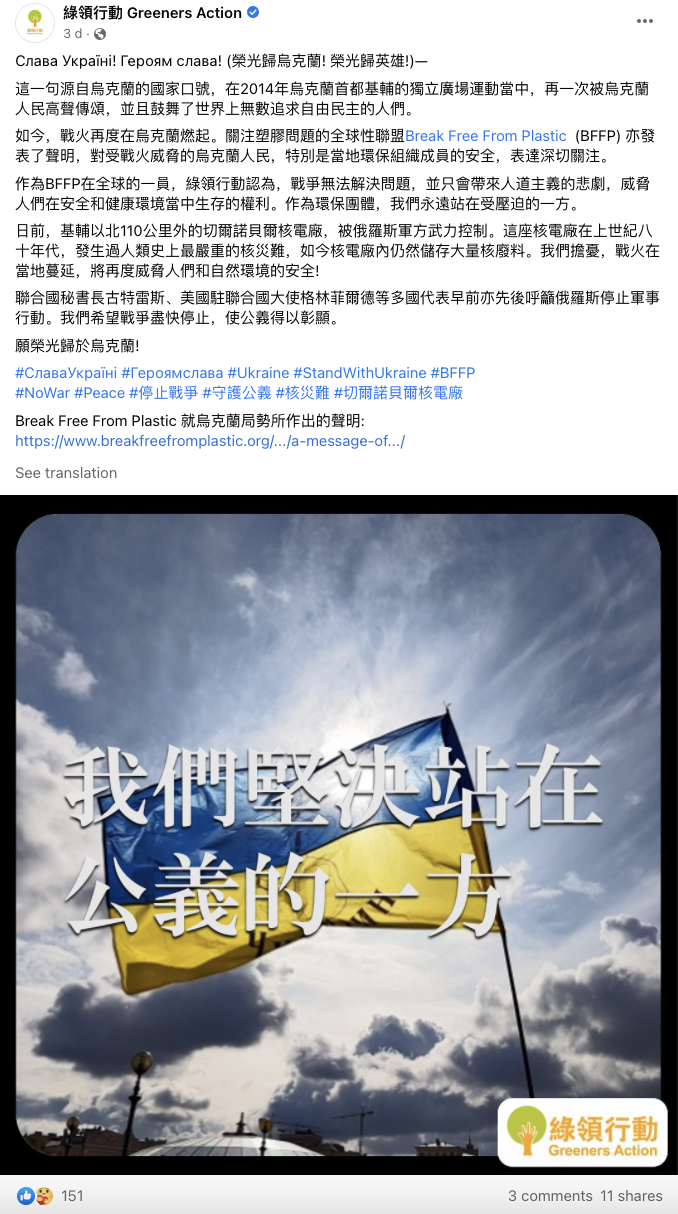
Manila — Today, The Coca-Cola Company announced its goal of having 25% of all beverages globally across its portfolio of brands sold in refillable/returnable glass or plastic bottles, or refillable containers, by 2030. This decision comes as #breakfreefromplastic members worldwide have spent years demanding the company reduce its reliance on plastic packaging.
According to the #breakfreefromplastic global brand audits conducted by thousands of volunteers each year, The Coca-Cola Company has consistently been the world's top plastic polluter. Our 2021 global brand audit volunteers found nearly 20,000 Coca-Cola branded products, representing more pollution than the next two top polluters combined—as has been the case every year since 2019. In addition, their unsustainable reliance on single-use plastic packaging has caused untold environmental damage and harm to communities.
Emma Priestland, Global Corporate Campaigns Coordinator for the Break Free From Plastic movement, said: “Coke’s announcement that they are expanding their reusable packaging target globally is definitely a step in the right direction. The company’s string of broken promises in the past, however, compels us to welcome this announcement with some skepticism. Given their resources and colossal plastic pollution footprint, we believe that the company can come up with more aggressive targets and be more transparent about how they intend to implement these commitments. We hope that other companies will also follow Coke’s lead and set reusable packaging targets.”
Mirko Moskat, Zero Waste Coordinator for Taller Ecologista in Argentina, and a Brand Audit Leader, said: “Today’s announcement is a demonstration of the tireless work that communities such as mine from around the world have done in pressuring corporations to address the devastating impacts of single-use plastics systemically. We hope Coca-Cola keeps up this commitment and moves away from its reliance on single-use plastic packaging.”
The Coca-Cola Company is one of more than 70 signatories that recently signed a statement calling for an ambitious global treaty that addresses the issue of plastic pollution. This month, national governments and multinational actors will gather for the next session of the UN Environment Assembly (UNEA-5.2), presenting the international community with a unique opportunity to make substantial decisions on the issue.
#breakfreefromplastic members, allies, and changemakers are calling for a legally binding Global Plastics Treaty to demand governments agree to a mandate coming out of UNEA-5.2 with specific legally-binding provisions and obligations covering the entire life cycle of plastics—from extraction, production, use, and disposal to remediation. It’s time for governments to prioritize the health of people and the planet over profit and corporate greed.
Press Contacts:
About Break Free From Plastic – #breakfreefromplastic is a global movement envisioning a future free from plastic pollution. Since its launch in 2016, more than 2,000 organizations and 11,000 individual supporters from across the world have joined the movement to demand massive reductions in single-use plastics and push for lasting solutions to the plastic pollution crisis. BFFP member organizations and individuals share the shared values of environmental protection and social justice and work together through a holistic approach to bring about systemic change. This means tackling plastic pollution across the whole plastics value chain—from extraction to disposal—focusing on prevention rather than cure and providing effective solutions. www.breakfreefromplastic.org
I am Megan Kirton, project officer at Fidra. We are an environmental charity based in Scotland named after Fidra island, a wildlife haven off the East coast. Fidra works to reduce plastic waste, prevent chemical pollution, and make space for nature in our environment. We use a scientific evidence-based approach, and work collaboratively with industry, government, and communities to find solutions to specific environmental issues.
The Great Nurdle Hunt
Nurdles are small plastic pellets made by the petrochemical and plastics industry and are used by plastics manufacturers to create nearly all plastic products. However, these plastics pellets are leaking out in high numbers across the whole plastics supply chain and ending up on our beaches across the world. This is resulting in extremely damaging plastic pollution, which affects ecosystems, oceans and marine wildlife.
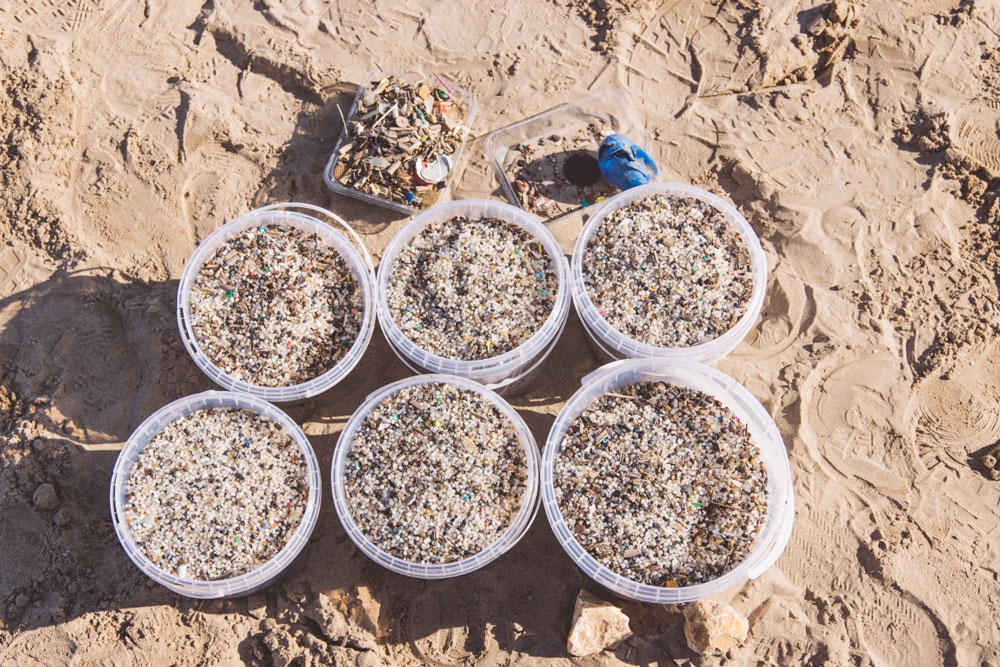
Photo credit: Kama Project, 2021
Once in the environment, nurdles are almost impossible to remove, reuse, or recycle, and are often mistaken for food by a range of marine wildlife. Studies have shown that plastic on beaches can release CO2, ethylene, methane and propane gases that all contribute to the greenhouse effect.
The Great Nurdle Hunt is Fidra’s flagship project and aims to fight this pollution from the petrochemical and plastics industry - nurdles. It is a global citizen science project that builds evidence of nurdle pollution. Our Nurdle Map shows the extent of nurdle pollution on coastlines across the world since 2013 when the project first began. This evidence has been collected from over 6,000 nurdle hunts done by thousands of volunteers and hundreds of organisations across the world, from Norway to New Zealand.
The great thing about the nurdle hunt is that taking part is easy, it can be done anywhere, anytime by anyone, you don’t need any equipment and by taking part you help to illustrate the global extent of this pollution.
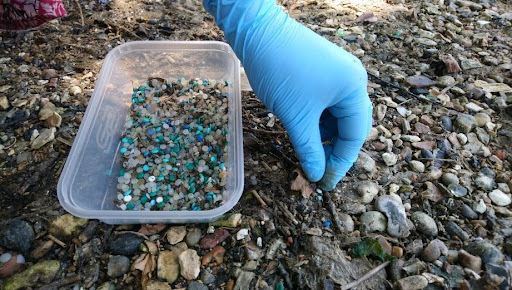
Nurdle collected in the Gallapagos (left) and nurdles collected from Chessel Bay nature reserve in Southampton, England (right). Photo credits: Maria E B, Mingas Por El Mar and Extinction Rebellion Romsey.
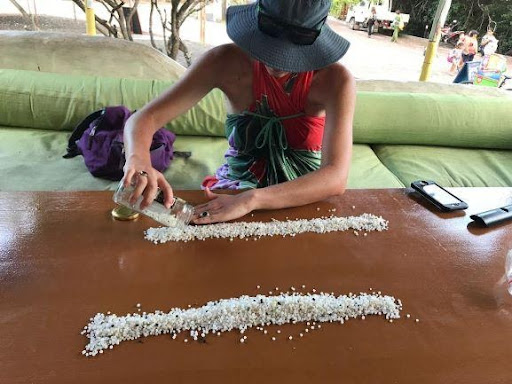
Through this, we aim to raise awareness and hold industry and governments accountable to this issue. Our ultimate aim is to stop pellet pollution at source, across the full plastics and petrochemical industry. This requires not only increased awareness, but a culture shift across companies handling pellets and recognition that the loss of pellets is a problem that must be addressed.
Achieving this does require different approaches, according to what works in different regions of the world. Yet at the same time, the complexity and international nature of the plastics supply chains means solutions should be compatible and complementary.
Fidra alongside other passionate NGOs in the BFFP movement have been working on solutions to pellet loss through the BFFP pellet loss steering group. We want best practice measures to contain pellets implemented as standard across the full plastics supply chain and verified by third party audits, which requires a legislative framework to fully address the issue.
We also share knowledge and information across our growing global network of organisations all working to achieve the best possible solutions to this pervasive pollution problem. Being a BFFP member has allowed us to grow this network and work with organisations all over the world!
Recent highlights of our work
The Great Global Nurdle Hunt 2021
We ran our third Great Global Nurdle Hunt back in October 2021. The event was a real success, with nearly 300 nurdle hunts taking place all over the world run by hundreds of volunteers. The results show that 92% of countries that took part found nurdles. Thanks to all the BFFP members who participated!
Nurdles at COP 26
Another achievement of the past year was getting to showcase the results of our Great Global Nurdle Hunt at COP 26 in November 2021. This allowed us to highlight pellet pollution to international decision makers showing them this is a widespread global issue that needs action now.
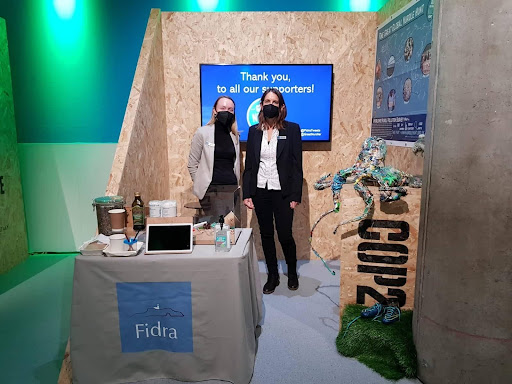
The Fidra team at COP26 | Photo credit: Fidra, 2021
Looking forward:
Since Fidra started working on nurdles almost 10 years ago we have come a long way in taking steps towards ending plastic pellet pollution. Nurdles are now widely recognised as a pollution issue globally and there is acceptance that we need to find a better solution than existing voluntary schemes.
We have used data from the Great Global Nurdle Hunt to engage and work with industry, trade associations, NGOs and decision makers to take steps towards a pellet supply chain free of nurdle pollution. However, we still have a way to go in stopping this pollution across the full global plastics industry.
This requires increased awareness, evidence, and increased interest from all sides: from investors to individuals, and The Great Global Nurdle Hunt has been crucial in allowing us to learn about a range of organisations across the globe who are tackling pellet pollution.
In 2022 we will aim to grow our global nurdle network further, working with ever more passionate people to end plastic pellet pollution. We will also aim to learn and showcase different solutions to pellet pollution.
If you or your organisation have been working on an approach, are inspired to work on pellet pollution or have any ideas of solutions to nurdle pollution, we would love to hear from you – email: info@fidra.org.uk
We can’t keep using energy and fossil fuels to create plastic that ends up in the environment and within our ecosystems. Nurdle pollution is a clear example of how plastic is being wasted before it has even been used and if we can prevent nurdle and plastic pollution, we can make ecosystems more resilient to the climate emergency and biodiversity crisis.
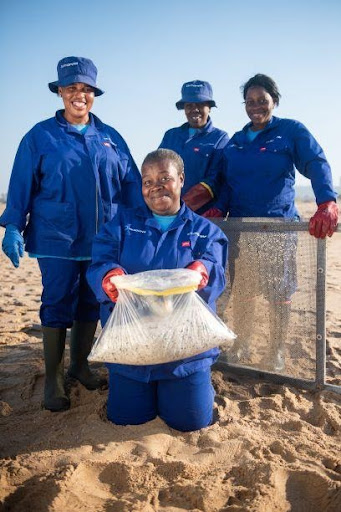
WildOceans South Africa participating in the Great Global Nurdle Hunt 2020. Photo credit: Kelvin Trautmann, 2020
How can the Break Free From Plastic movement help?
Get Hunting
You can take part in a nurdle hunt anytime, anywhere! If you’re new to nurdle hunting check out our how to take part webpages. By adding data to our online map, you continue to build our worldwide picture of nurdle pollution, supporting solutions work internationally.
Spread the word
Sign this petition which is calling on the International Maritime Organisation to set obligations for industry to take responsibility to prevent nurdle spills at sea. In May 2021, the MV X-Press Pearl spilt 1,680 tonnes of nurdles off the coast of Sri Lanka. It is the worst environmental disaster in the country's history, and the single largest nurdle pollution event the world has ever seen. Read more about this here.